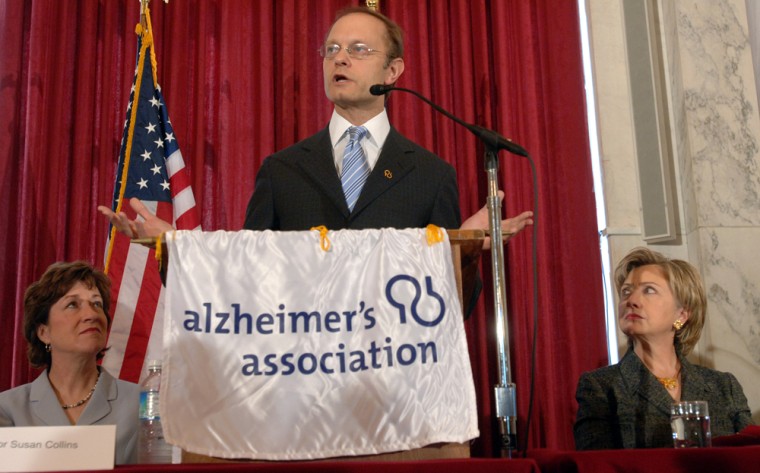Q: How long have you been involved with the Alzheimer’s Association?
A: 10 years.
Q: Why this cause over others?
A: Well, I have a personal connection. My grandfather and my dad both had Alzheimer’s. So having experienced it in my family I recognized what a what a terrible disease it was and it gave me a chance to continue to fight the war against Alzheimer’s, even though we had to lose those particular battles with my dad and my grandfather.
Q: What do you do for the charity?
A: I do a bunch of stuff. The very first thing I did was I did Celebrity Jeopardy to raise money and since then I’ve gotten involved in the Memory Walks in Los Angeles and New York and in my hometown, Saratoga Springs, in upstate New York. I’ve joined the national board, and I’m a national spokesperson, so I do public service announcements and speak around the country. Also I’ve been to Congress several times to testify at Senate and House hearings about trying to raise additional funds for research and to take care of people with Alzheimer’s.
Q: What’s the most impressive thing this charity does?
A: The Alzheimer’s Association is the largest private funder of Alzheimer’s research in the country, so that’s impressive. The other thing that’s great about them is that they while they are putting so much energy and time and money into research and into finding ways to prevent and slow down and ultimately cure Alzheimer’s, they’re putting just as much into taking care of people who have it now. They’re especially good at reaching out to people with the disease and to their families, providing support groups, a 24-hour call line for help or references, the safe return program, which is an identification program for people who with Alzheimer’s who wander away, which is a very common problem. They also have reached out to doctors to help them understand more about the disease, to patients so they are better equipped to talk to their doctors and understand what their doctors are telling them, and to very diverse communities -- Hispanic communities, African communities, Asian communities -- because all those different groups view Alzheimer’s and aging and diseases of the brain very differently and they need to be dealt with differently.
Q: What’s the most-moving experience you’ve had since becoming involved with this group?
A: Something that has happened over the last 10 years that I’ve been involved and this has a lot to do with breakthroughs in research -- a lot of them funded by the Alzheimer’s Association -- is that there has been a greater ability to diagnose Alzheimer’s and to identify it at a much earlier stage. What that means is I have been able to see people with Alzheimer’s go to Washington and stand before our representatives and tell them very matter-of-factly and very coherently what’s in store for them, what they’re looking at in their future as this disease will dismantle first their minds and then their ability to function. … It’s extremely powerful and extremely emotional to be in the presence of someone who is facing that but is able to articulate what they’re facing. It’s also very important because with a disease like this, so much of the time we tend to think that it doesn’t affect us. ‘Well it’s a thing that older people get and we don’t have to worry about it and isn’t that sad.’ When you are confronted someone in their 50s or 60s standing before you and explaining that their memory is going, that they soon will no longer recognize their husband or wife, or their children, that their ability to make a living is being taken from them, that every memory that has made up their life up to that point is being taken from them. That is something that no celebrity or scientist or anyone else can convey with that sort of power and poignancy.
Q Why should people support this cause?
A: All of us have Alzheimer’s disease in our future. The statistics are very discouraging even as the research is very encouraging. The older you get, the more your chances are of getting it, and by the time people are into their 80s, half will have Alzheimer’s disease. That makes it pretty certain that if you are not going to get it yourself, you’re going to be taking care of someone who has it, someone you love. That’s another reason it’s such a complicated and extensive disease, because it affects not only the health of the person who has it but also the physical and emotional health of spouses and children. It has such devastating consequences for all of us, for the healthcare system, the cost to businesses in lost work and additional health-care expense. All of those problems will be compounded by the aging of the baby boom generation and the fact that the numbers of people with this illness is just going to keep growing and growing and growing and growing. … Research takes time and research takes money and we can’t afford to wait really any longer to increase the funding for research, to increase funding for ways to take care of people with the disease because the epidemic is upon us.
For more information on the Alzheimer's Association, visit
